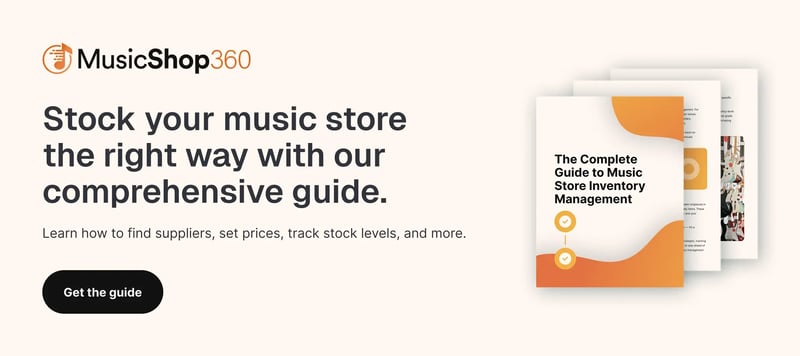
A music retail store can be a rewarding endeavor, but opening one requires a significant investment.
So, here’s the question: How much does it cost to start a music store?
Successfully opening a music store requires extensive research and careful planning. As an aspiring music store owner, you need to understand startup costs well in advance to make sure you’re prepared to make this financial leap.
In this blog, we’ll list the necessary expenses involved in starting a music store, provide estimated ranges of cost, and break down the reasons for these estimates. By cultivating a detailed knowledge of required expenses, you’ll be prepared to accomplish your goal of opening a music store.
How Much Does It Cost To Run a Music Store? A Breakdown of Key Expenses
The amount of capital necessary to start a music store varies greatly depending on the kind of store you’d like to open. The size and location of a store, the kinds of instruments sold, and the services offered all influence how much opening the store will cost.
Here, we’ll outline a variety of necessary expenses to consider and provide estimated ranges of cost. Online research allows you to find general ranges for these expenses, but more specific numbers require you to know your store’s location, size, and market.
Building Rental
Estimate: $1,500–$5,000 per month
While this estimate is given in monthly cost of rent, most rental spaces are advertised in cost per square foot, per month or per year. Multiplying that cost by the square footage of the space gives you the monthly or yearly cost of rent.
Price fluctuates based on the size of the space and the location. Larger spaces and spaces in more populated areas charge more for rent. For example, a retail space in New York City would be priced high, while a retail space in a small town is likely priced lower. While a more populated area is more expensive, it’s also likely to draw in more customers, which should be taken into account.
You also need to consider how large your store needs to be, which depends on how much inventory you plan to have in your store at a given time. Music stores that sell pianos tend to require a large space, while a store that focuses on guitars may not require as much square footage.
Determine how much space you need, what location is most ideal, and what’s in your budget, and you can find the right location for your store.
Musical Instrument Inventory
Estimate: $5,000–$100,000
The price of filling your store with musical instruments can vary greatly depending on the kinds of instruments you sell and their quality. Some music stores choose to focus on one or a few kinds of instruments, such as piano shops and guitar shops. Other stores are one-stop shops for a wide variety of instruments. Depending on what you choose, you may split up your inventory budget among various instruments based on their popularity.
Before you purchase inventory, decide on the quality of instruments you want to sell. You may choose to sell high-end instruments, or more basic instruments that are a better fit for students and other beginners — or you may decide to carry both. Understanding your price range and the local market for musical instruments will help you make the right decision for your store.
Related Read: Inventory Management System for Music Store: 5 Providers
Store Fixtures and Decor
Estimate: $5,000–$15,000
To store and display musical instruments, you need shelving and display equipment. Some instruments, like guitars, can be displayed on a wall with secured wall hooks. This saves space on the sales floor and gives potential buyers a better view of the instruments. You also need a checkout counter to place your point of sale (POS) system, so you can process sales transactions.
Simple furniture at your store can also be a good investment. Chairs, benches, or stools give customers a place to sit as they test out a guitar or violin. Paying attention to these details helps music store owners create a more inviting atmosphere, enhancing the shopping experience for customers.
Utilities
Estimate: $200–$600 per month
Utility bills include essentials like electricity, water, heating, and air conditioning. These costs vary by the size of your store and local utility rates.
Although this amount may seem small when compared to your other expenses, remember to factor it into your music store’s budget, and to account for fluctuations in utility expenses. For example, in the summer and winter, heating and cooling costs will rise, respectively. By keeping estimated utility expenses in your budget, you can avoid unexpected surprises.
Advertising and Promotion
Estimate: $1,000–$5,000 for initial launch; $500–$2,000 ongoing monthly
Your budget for marketing and advertising can be adjusted based on the resources you have and how much you want to spend. There are many channels that can be used to advertise.
Here are some examples of effective advertising channels:
- Social media
- YouTube
- Television
- Radio
- Flyers
- Billboards
- Magazines
You can either pay someone to create advertisements for you, or, if you’re confident in your abilities, you can create your own. If you pay someone to create ads, remember you also have to pay to place these ads. Be careful not to let your advertising budget get out of control.
On average, business-to-consumer product companies spend about 9.8% of their revenue on advertising. You may choose to spend more or less than this, but pay close attention to the increases you see in sales.
If a certain type of ad isn’t working, discontinue it and focus on something else. If you find that another channel is bringing lots of customers into your store, you may consider spending more money to increase advertising on this channel.
Related Read: 8 Music Store Marketing Strategies To Improve Sales
Insurance
Estimate: $500–$2,000 annually
Insurance protects your music business from unforeseen issues that can jeopardize it. There are many different insurance policies that can be taken out to protect various aspects of your business.
Here are a few common insurance policies designed for small businesses:
- Commercial property insurance
- General liability insurance
- Commercial auto insurance
- Professional liability insurance
- Workers’ compensation insurance
You can also get a bundled insurance policy that combines several of these policies. An insurance agent can help you analyze the risks associated with your business and determine which policies are necessary for your music store.
Employee Salaries
Estimate: $2,000–$8,000 per month
You can’t run your store alone, and you can’t be there 24/7. Hiring a team of reliable employees allows you to keep your store open longer and serve more customers, increasing sales.
Employees should be fairly compensated for their work. Depending on the size of your store, you may need only a few employees, or a larger team of employees. Offering competitive salaries helps you hire and retain more capable employees.
POS System
Estimate: $1,000–$5,000 for setup; $50–$200 per month for software subscriptions, plus payment processing fees
A quality POS system is invaluable for a small business. In addition to managing sales transactions, a POS system can help you manage your inventory, set up e-commerce, and analyze your sales data.
Different POS systems have different payment structures, and many systems require a custom quote.
Related Read: Top Music Store POS Software Providers [Features & Pricing]
Licenses and Permits
Estimate: $200–$1,000
When you’ve determined where your store will be located, research local requirements for business licenses and permits. Be sure to proactively apply and pay for all necessary licenses and permits, which helps you develop positive relationships with local organizations and avoid potential legal issues.
Website Development and Maintenance
Estimate: $2,000–$10,000 for development; $50–$200 per month for maintenance
When people want to buy something, they typically turn to the internet first. Your music store needs an online presence to be noticed and to let the public know when you’re open, what you sell, and where you are. A professional, well-designed website that’s easy to use lends you credibility and draws people to your store, leading to sales.
A website needs continual work and attention to keep it running, updated, and secure. This may come at an additional cost, but a faulty website will cost you business, so maintaining your website is well worth it.
You may be able to bundle website development and maintenance with other services. Music Shop 360 is an all-in-one POS system that offers a variety of music-store-specific services to help you run your business. Customers receive a custom-designed website and continual website upkeep. Using a service that includes a website saves you money and simplifies the process.
Related Read: Music Shop Website Design: How We Build Winning Websites
Miscellaneous Costs
Estimate: $1,000–$3,000
Doesn’t it seem like everything is always a little more expensive than you plan for? This is true for starting a business.
You need to budget a little extra for odds and ends like office supplies, cleaning supplies or services, and other unexpected expenses. It’s always better to add a little extra to the budget and come in under budget than to assume everything will go as planned and come in over budget.
So, How Much Does It Cost To Start a Music Store?
Total Startup Cost Estimate: $20,000–$157,000
All in all, we estimate the total cost of starting a music store to fall between $20,000–$157,000, depending on many factors. Some of the most important of these factors are the size and location of your building, the size and quality of your inventory of musical instruments, and how many employees you need to hire.
You also need a solid point of sale system, a reliable website, and advertising. Do research to determine the right amount to spend on each of your startup expenses so you can set up a successful music store without going over budget. An informed estimate of how much revenue you can expect in your first year will help you determine what you can safely budget for startup costs.
It’s also helpful to seek financial advice from a professional before you jump in with both feet. A licensed financial advisor can help you more precisely estimate key financial figures based on your location and market.
Once you start your music store, Music Shop 360 is here to help you take it to the next level. Music Shop 360 is a cloud-based POS solution designed specifically for music stores, with all the features you need to make your store a success.
With payment processing, e-commerce solutions, music inventory management, custom website design, and marketing tools, you’ll have the support you need to get your store off the ground and keep it running for years to come. To learn more, schedule a demo today!




 by
by 



